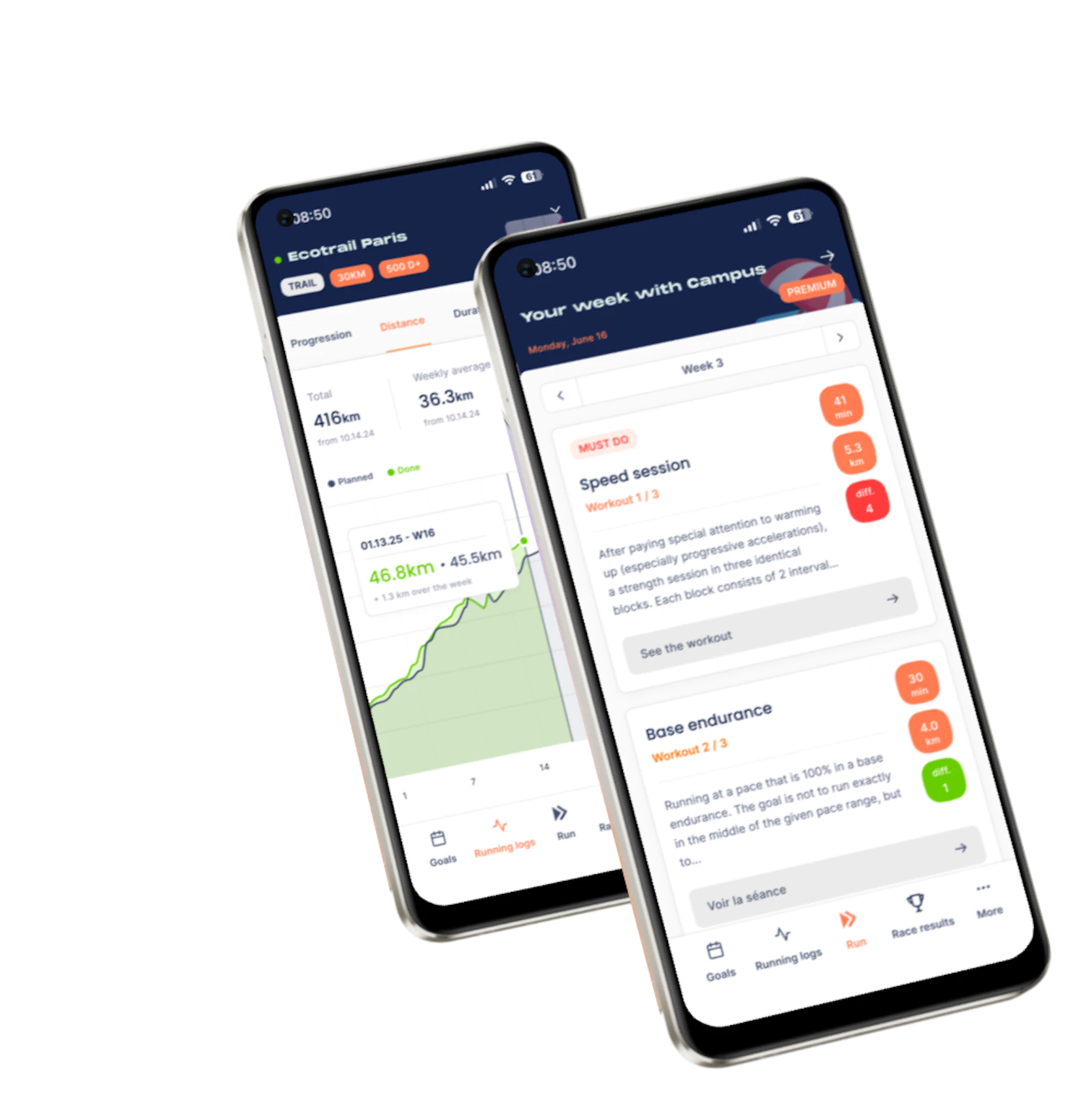The 16-week marathon preparation plan: the pros and cons

14 min read
Summary
How to train for a marathon in 16 weeks?
What are the stages of a 16-week marathon preparation plan?
Is it possible to finish a marathon with only three running workouts per week?
What are the essential workouts of a marathon program?
⏱️ Long runs at marathon pace with active recovery
⚡ Intense workouts faster than your specific race pace: interval training, MAS
🆒 Base endurance running
Focus on invisible training during your marathon preparation
🏋🏻♀️ Strength & conditioning
😴 Rest management, mental preparation, and nutrition advice
16-week marathon preparation plan: the pros
Suitable if you already have a good weekly training volume and good endurance
Ok, if you are experienced and/or have already run a marathon
Yes, if your main goal is to be a finisher
16-week marathon training plan: the cons
Unsuitable if you are new to running
Too short if you're coming off a long break or get injured regularly
What is the ideal duration to prepare for a marathon?
What program duration for a beginner?
What is the ideal duration to aim for good progress in your marathon paces?

Receive advice from our passionate coaches!
It's decided, you're ready to take the leap and embark on the great adventure of a marathon training. At Campus, we encourage long-duration preparations. For us, giving yourself time is the best way to progress at your own pace, without stress, to vary the training pleasures and to achieve your goals while limiting the risk of injuries. Now, let's see together if a 16-week marathonpreparation plan suits you.
How to train for a marathon in 16 weeks?
If you're a regular reader of this blog, you already know that a structured training plan always consists of three phases: general development, specific development, and finally tapering. Here, we will focus on the specifics of a 16-week marathon training plan.
What are the stages of a 16-week marathon preparation plan?
Regardless of your level, a marathon training plan requires both a good structure and a significant training load compared to your usual habits. It's logical to push the limits because we want to get you running for 42.195 km. Initially, the general development phase aims to improve your physical condition. We often say that the success of a marathon is built during this initial phase, several months before the deadline. In a 16-week training plan, the first four to six weeks are dedicated to the progressive increase of your weekly mileage and to developing your speed qualities. Once this foundation is acquired and you're ready to handle more significant loads, we will focus on the marathon pace and long runs; this is the specific development phase. Finally, three weeks before the race, we progressively reduce the volume. It's the tapering. A mandatory step if you plan to reach your shape peak on D-day.

Is it possible to finish a marathon with only three running workouts per week?
The number one factor for endurance progress is the frequency of workouts. If you want to observe lasting progress, we encourage you to run at least every other day. Moreover, one of the essential prerequisites before setting a marathon goal is to run at least three times a week. That's the minimum frequency. Nevertheless, you will gain a lot by adding a fourth workout to your schedule. The idea is to spread the weekly volume over a larger number of workouts. Indeed, your body assimilates small regular stresses better than large less frequent stresses.
What are the essential workouts of a marathon program?
Preparing for a marathon requires a significant long-term investment. To prevent your training plan from becoming boring, we recommend varying your workouts as much as possible. This is what the Campus plans offer. Here, we focus on the essentials.
⏱️ Long runs at marathon pace with active recovery
There's no secret. If you want to run your future marathon in good conditions, you'll need to learn to run long. Long runs beyond two hours are the best possible workouts to build good physical and mental endurance. Ideally, include intervals at marathon pace during your long runs to learn to maintain your pace in a state of pre-exhaustion. Week after week, we progressively increase the duration of long runs, by intervals of five to ten minutes, until reaching 2 hours 30 minutes, three or four weeks before your marathon. It's the test workout.

⚡ Intense workouts faster than your specific race pace: interval training, MAS
The interval workouts are not only reserved for elites or runners aiming for performance. Everyone can benefit from the advantages of these fast workouts. They are relevant to you if you want to gain comfort in your practice. The principle is easy to understand. By performing intervals faster than your marathon pace, you will raise your aerobic ceiling — the VO2 max — as well as your speed ceiling. In this way, you'll be more comfortable at your marathon pace. Magical, isn't it? A good marathon preparation plan generally includes early preparation MAS workouts, then slightly slower intervals around your 10-kilometer or half marathon paces.
🆒 Base endurance running
Training is a matter of balance and dosage. To counterbalance the difficulty of long runs and the intensity of intervals, you also need to accumulate easy kilometers in training. The base runs play this role. They help you recover better and assimilate the tough workouts… this, provided you can manage your effort. Remember this saying well: you never run too slowly in a base run, but you often run too fast.
Focus on invisible training during your marathon preparation
As surprising as it may seem, your progress during your marathon training does not depend solely on running, but also on other factors. We'll talk about it right here. ⬇️
🏋🏻♀️ Strength & conditioning
In running, the longer the duration of the effort, the more important muscular endurance is. Just observe the posture of runners in the last third of a marathon. Often, their stride deteriorates due to muscle fatigue. Strength & conditioning will help you delay muscle fatigue to the maximum. It also plays a major role in injury prevention. Stronger muscles protect tendons and joints. If you choose to follow a marathon Campus training plan, include at least some strength & conditioning and core training in your program. You can also add joint mobility and stretching routines to gain flexibility. Flexible muscles are stronger!
😴 Rest management, mental preparation, and nutrition advice
As you've seen, marathon preparation puts your body under considerable strain. Hence the need to recover well between each workout. Sleep and nutrition are two pillars of recovery. We invite you to follow all the advice from Mélanie, our nutritionist. The third important pillar is stress management in daily life. Unlike a professional athlete, running is not your priority. External stress caused by your personal and professional life has a direct impact on your preparation. So listen to your feelings and adapt your workouts according to these external factors. There are techniques to lower your stress level and help you succeed in your marathon.
16-week marathon preparation plan: the pros
We will define which profiles a 4-month marathon preparation plan is suitable for and who we advise to prefer a longer plan.
Suitable if you already have a good weekly training volume and good endurance
A duration of 16 weeks, almost four months, is comfortable if you already have a good foundational base. With a good training frequency and a good baseline weekly volume, you will reach the sufficient physical condition to handle marathon pace workouts faster. Similarly, if you can already run without problems between 1 hour 30 and 1 hour 45 when starting your program, you will only need a few weeks to complete long runs of two hours and more. You will also have time to refine your effort nutrition, a very important ability in the marathon. Indeed, a key point of this event is to maintain a good carbohydrate store to push through the energy wall.

Ok, if you are experienced and/or have already run a marathon
The body has a memory. As an experienced runner, you have better assimilation capacities than a beginner. Consequently, you can afford to increase your weekly volume a bit faster and thus shorten your preparation duration. Compared to a novice runner, you will enter the specific phase of your training earlier. Even better, if you have already run one or more marathon(s), you already have references. You know the challenge that a marathon preparation represents, the mistakes not to make. You probably know your areas to improve… for example, focusing on strengthening certain muscles, etc.
Yes, if your main goal is to be a finisher
Your only ambition is to cross the finish line of the marathon and you don't want or can't dedicate more than 16 weeks to preparing your goal? As long as you are not completely new to running and can run at least an hour, this goal is within your reach. In your case, we will emphasize the general development phase and prioritize volume over intensity. Your marathon pace won't be optimized concerning your potential, but that's not a problem. We are more about making sure you have the best possible time and that you cross the finish line with a smile!
16-week marathon training plan: the cons
A 4-month marathon preparation does not suit all types of runners. Here are the ones we're talking about.
Unsuitable if you are new to running
As a beginner, it's already a good decision to bet on a structured training program. You have understood that we don't approach such an event lightly. However, if you're starting from zero or almost, you will need more than 16 weeks to prepare physically and mentally for this challenge. Indeed, a 16-week marathon preparation plan implies that you are capable of running at least two hours after about two months of training. If you have no running experience, it's an almost impossible mission. That's why we advise all beginners to opt for a marathon training plan of at least 6 months.
Too short if you're coming off a long break or get injured regularly
If you're coming off a long break without running, your body has de-adapted and is not ready to directly handle a marathon preparation plan. It's better to start slowly, gradually increase your training volume, then progressively reintroduce some intensity. After a few weeks of getting back in shape, you can then start a 4-month marathon preparation plan. The alternative is simply to choose a longer plan, 20 or 24 weeks, or even 12 months.
If you tend to get injured regularly, the keyword is gradual progression. You need to give your body time to adapt to the training load. Again, we recommend a plan longer than 16 weeks, complemented with strength & conditioning.

What is the ideal duration to prepare for a marathon?
As you've seen, the duration of marathon preparation varies a lot depending on profiles and goals. Rather than an ideal duration, we prefer to talk about a recommended minimum duration.
What program duration for a beginner?
If you have less than a year of running practice with some races under your belt in intermediate formats like the 10 kilometers or the half marathon, it's reasonable to set a marathon goal within six months. It's a good duration to develop your runner's background and to prepare your marathon serenely. Your goal will be to cross the finish line in the best possible conditions without setting an overly ambitious goal for your discovery of this format.
If you are completely new to running, we recommend following a one-year training program, and especially, setting intermediate goals to gradually increase your running distance.
What is the ideal duration to aim for good progress in your marathon paces?
If your profile is more competitive, more performance-oriented, a 12-week marathon preparation is the strict minimum, provided you already have good physical condition. By extending to 16 weeks, you give yourself the opportunity to complete more long runs, get used to your marathon pace, while progressively increasing your training load. Another advantage of a longer training plan is being able to easily fit in a preparatory race into your program.
At Campus, we are strong advocates of long preparations, whether for the marathon or for shorter distances. However, not everyone has the ability or the desire to dedicate six months to preparing for their marathon. A 16-week marathon training plan is an excellent compromise for many runner profiles. Unless you are new to running, this duration allows you to prepare under good conditions and experience preparation without stress. Now, there's only one way to know if a training plan suits you: test it in real life!











